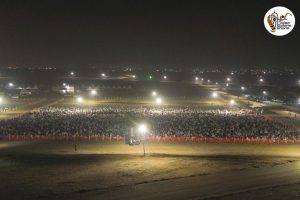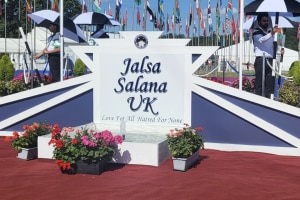
Taoheed Olaosebikan Shoboyede, Nigeria
The most important and indispensable ingredient of human life, which until now has continued to elude the world for centuries, is peace, for which world organizations such as the UNO and other such agencies, as well as governments around the world, have shown ‘concerns’, as it were. A lot of resources, both human and materials, have been committed to this project of enthroning peace in the world. But it appears that the more efforts they make to establish it, the more elusive it remains.
However, from the Islamic viewpoint, this is not what the Creator of the world (Allah in Islamic terminology) had intended for the world. Hence, Allah gave mankind a way of life that is capable of establishing an enduring peaceful human society, which was taught and practised by His chosen Prophets over many centuries. This way of life was brought to completion and perfection through the greatest of them all, the unlettered Prophet from the Arab desert–the Holy Prophet Muhammad (sa)—with the greatest Magna Carta that the world can ever have, which is the Qur’an. For instance, in the Qur’an, God Almighty commands:
‘And create not disorder in the earth after it has been set in order…’ (The Holy Qur’an. 7:56)
The Holy Prophet Muhammad (sa) succeeded in accomplishing the will of God over the period of his twenty-three year span of prophethood; even to the utter amazement and admission of erstwhile detractors. But it is unfortunate that, after the demise of the Holy Prophet (sa), the world; either inadvertently misconstrued his teachings, misapplied, or deliberately corrupted them and, as such, misrepresented them altogether. The implication of this, therefore, is that evils and disorder of all manners and dimensions now envelops the entire human world; which God Almighty Himself corroborated in another part of the Qur’an thus:
‘Corruption has appeared on land and sea because of what men’s hands have wrought...’ (The Holy Qur’an, 30:42)
Nevertheless, God, out of His infinite mercy for the world, raised a true follower of the Holy Prophet Muhammad (sa) in person of Mirza Ghulam Ahmad (as) of Qadian, who appeared towards the end of the 19th century to revive the system established by the Holy Prophet Muhammad (sa), so that the world might continue to have and enjoy true peace.
Mirza Ghulam Ahmad (as) claimed to be the same Promised Messiah being expected by adherents of many world religions and the Imam Mahdi being expected by the Muslims, as unambiguously prophesied by the Holy Prophet Muhammad (sa). Mirza Ghulam Ahmad (as) established his community (the Ahmadiyya community) through divine inspiration, in 1889, to practically demonstrate how the Almighty God wants mankind to live and perpetuate peace in the world.
It is for this ultimate objective that the Promised Messiah (as) started the annual gathering of his followers in Qadian in the year 1892, with less than a hundred attendees in the first year. This gathering, now famously known as Jalsa Salana, is not only being replicated in more than one hundred countries across all the continents of the world, but it is also now being attended every year by hundreds of thousands Ahmadi Muslims of different races, colours, languages and, of course, cultural backgrounds.
The gathering, wherever it is held in any part of the globe, typifies what the world should be –a world in which every human being of whatever background or persuasion, would coexist with one another without any form of fear; where people will always aspire to do good to one another, not out of any fear of being caught up by the laws of the land, but for the fear and love of their Creator, in Whose existence they unreservedly believe.
The 57th edition of this annual gathering (Jalsa Salana) of the Ahmadiyya Muslim Community United Kindom was held from the 28th to the 30th of July, 2023. Yet again, it convincingly established the fact that the Ahmadiyya Muslim Community gathering, wherever it is held, is the model template needed by the world to establish an enduring peace for all in the world.

The three-day convention was attended by over forty-one thousand participants from over one hundred and twenty countries across all the continents. At this convention, all the indications to measure and ascertain a peaceful society were sufficiently and convincingly on display.
Although the Jalsa itself was a three-day event, about one week prior to the convention days, thousands of foreign delegates had arrived in the UK, quartered at various centres around London area. This multitude was aside from hundreds of others, majority of them volunteers, who had been working tirelessly day and night for about two weeks if not more, in order to turn a typical farmland to a mini city, for the convenience and comfort of all the expected attendees. They did all of this not because they expected any form praise, remuneration or any form of worldly reward, but selflessly, only to seek and win the pleasure of Almighty Allah, Whom they believe is the most Appreciative.
For instance, the standard of leadership-followership, in which the high level of love, affection, loyalty, faithfulness, universal brotherliness and, of course, empathy for as well as unreserved confidence in one another, which radiated in this community, can rarely – if at all – be found anywhere in the world.
Anyone attending witnessed a large diverse gathering of more than forty-one thousand people of different background and sentiments; doing the same things, the same way, the same time and under the directive of one single leader; a leader who does not possess any of the means or force which governments of different countries of the world solely depend on to rule their people). All the attendees ate the same meals and, more surprisingly, where there was a security presence, they did not have much to do, due to the peaceful nature of the event and its attendees.
Perhaps this explains why this year edition of the Jalsa Salana UK was themed on a clause from the Holy Qur’an that:
‘...I will make thee a leader of men…’ (The Holy Qur'an, 2:125)
All the speeches delivered the dignitaries, especially the four soul-inspiring and heart-melting addresses (five including the Friday Sermon) delivered by the Fifth Caliph and Worldwide Head of the Ahmadiyya Muslim Community, His Holiness, Hazrat Mirza Masroor Ahmad over the course of the Jalsa, were all thematically related to the main theme of Ahmadi Muslims leading the world in attaining and perpetuating peace for all.

The Jalsa Salana exhibited clearly the fact that whenever and wherever self-discipline and self-respect, devoid of any form of force or intimidation, prevail in any society, it will be extremely difficult – if not impossible – for any external body to venture into fomenting any form of crime or crime-related behaviours.
This convention was well attended by top-level government representatives, parliamentarians, traditional rulers, academics, community/opinion leaders and heads of business empires from different parts of the world; all of whom highly commended and complimented the gathering. Most of them predicated their remarks about the Ahmadiyya Muslim Community on two premises which they personally: Divine support of the Community and the Community’s exemplified motto of Love for all, hatred for none.
Even many world class media organizations were in attendance at the Jalsa and they could not help confessing that it was an experience that they had not witnessed anywhere else.
In fact, every country of the world would need to send high-power delegations of their respective countries to this Ahmadiyya Muslim Community Jalsa Salana every year, if only to learn, how true peace may reign supreme in their respective countries.
About the Author: Taoheed Olaosebikan Shoboyede is an Imam of the Ahmadiyya Muslim Community in Nigeria. He converted to Ahmadiyyat in 1964 at the age of 12 and later devoted his life to the service of faith in the early 1980’s. He has served in various departments and in different capacities over the years. He currently coordinates a team of Imams in Nigeria for the propagation of Islam Ahmadiyyat.




Add Comment